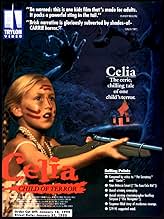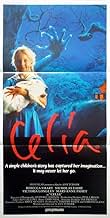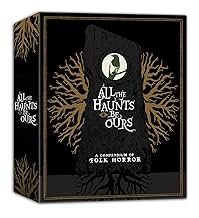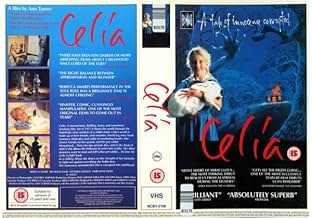NOTE IMDb
6,8/10
1,7 k
MA NOTE
Une jeune fille imaginative et quelque peu perturbée fantasme sur des créatures maléfiques et d'autres bizarreries pour masquer ses insécurités alors qu'elle grandit dans la campagne austral... Tout lireUne jeune fille imaginative et quelque peu perturbée fantasme sur des créatures maléfiques et d'autres bizarreries pour masquer ses insécurités alors qu'elle grandit dans la campagne australienne.Une jeune fille imaginative et quelque peu perturbée fantasme sur des créatures maléfiques et d'autres bizarreries pour masquer ses insécurités alors qu'elle grandit dans la campagne australienne.
- Récompenses
- 2 victoires et 2 nominations au total
Avis à la une
As far as I can see, "Celia" is a complex movie about childhood that lacks something. It fails to make the viewer understand the way the heroine feels and thinks. The heroine is Celia, a young girl who grows up in Australia in the 1950s.
I must mention that I was way disappointed by the contents of the movie. If only because the plot summaries I read about it in diverse magazines turned out pretty wrong. They were like: "9-year-old Celia has no playmates except for her rabbit. When a policeman takes away the rabbit from her, she vows revenge." Alright, but that's not the gist of it. Celia is not an isolated or lonely little girl, first of all, she's rather horrifyingly lively. She does have playmates, three neighbour kids whose parents are communists. Celia actually spends more time with these kids and with their mother than she does with her own parents. Moreover, many scenes deal only with these children's play. Most of the time they play in some desert landscape, which seems kind of grotesque, where there is caves and rocks and sand - but hardly any people or animals. Grotesque - that's what the movie appears to be like. We have these two parties of kids: The children of the communists and the "communist haters" and they fight a rather serious battle. And we have that crazy idea of the government that rabbits were pests. I don't object to "grotesque" stories, but a certain deal of irony is required to make them enjoyable - this movie lacks irony.
Still we get a good impression of how complex the worlds children make up of their fantasy really are. We also learn how adults don't have any idea about the thoughts children have, about the crazy wars they deliver, about the friendship or the hate they feel. As this movie is seen through the eyes of a child, of course the adult's "play", i.e. the hate towards communists, is not dealt with very openly.
That wouldn't matter, if we were really offered the opportunity to identify with the child. But here the movie lacks care and empathy, we don't get close enough to little Celia - played by Rebecca Smart. This young actress doesn't do a bad job, that's for sure, but she isn't outstanding either. She's working about on the same level as the whole movie is.
I'll vote "6" for "slightly above mediocre", v e r y slightly, honestly.
I must mention that I was way disappointed by the contents of the movie. If only because the plot summaries I read about it in diverse magazines turned out pretty wrong. They were like: "9-year-old Celia has no playmates except for her rabbit. When a policeman takes away the rabbit from her, she vows revenge." Alright, but that's not the gist of it. Celia is not an isolated or lonely little girl, first of all, she's rather horrifyingly lively. She does have playmates, three neighbour kids whose parents are communists. Celia actually spends more time with these kids and with their mother than she does with her own parents. Moreover, many scenes deal only with these children's play. Most of the time they play in some desert landscape, which seems kind of grotesque, where there is caves and rocks and sand - but hardly any people or animals. Grotesque - that's what the movie appears to be like. We have these two parties of kids: The children of the communists and the "communist haters" and they fight a rather serious battle. And we have that crazy idea of the government that rabbits were pests. I don't object to "grotesque" stories, but a certain deal of irony is required to make them enjoyable - this movie lacks irony.
Still we get a good impression of how complex the worlds children make up of their fantasy really are. We also learn how adults don't have any idea about the thoughts children have, about the crazy wars they deliver, about the friendship or the hate they feel. As this movie is seen through the eyes of a child, of course the adult's "play", i.e. the hate towards communists, is not dealt with very openly.
That wouldn't matter, if we were really offered the opportunity to identify with the child. But here the movie lacks care and empathy, we don't get close enough to little Celia - played by Rebecca Smart. This young actress doesn't do a bad job, that's for sure, but she isn't outstanding either. She's working about on the same level as the whole movie is.
I'll vote "6" for "slightly above mediocre", v e r y slightly, honestly.
This strange little movie from the land Down Under is really two movies, one of which definitely works, but the other not so much. On one hand, it is a fairly realistic portrait of rural Australia in the 1950's that was dealing with both a plague of rabbits and of Communists. In retrospect, the wild rabbits had a far better chance of over-running conservative Australia than the commies, but the wars on both these "plagues" were somewhat similar in that, as well-intentioned as they may have been, a lot of innocents were caught in the crossfire. "Celia", the young heroine of this film, for instance, has recently lost her Communist grandmother and loses her only friends due to their parents ties to the Australian CP. The fateful blow,however, comes when she loses her beloved pet rabbit "Murgatroyd" to the authorities.
"Celia" is portrayed as having a rich fantasy life that leaves her disturbed and even dangerously disconnected from reality (not unlike the two young girls in the later Peter Jackson kiwi film "Heavenly Creatures"). However, the movie does not focus on this dark fantasy aspect nearly enough, and "Celia" is portrayed as a rather ordinary and, moreover, very sympathetic young girl, which makes the one scene of real-life violence that occurs (actually, it is left a little ambiguous) not very believable. It also doesn't help, as others have said, that in America they seized on the under-developed and unbelievable aspects by trying to market this as a horror movie. This is not quite as good as Peter Weir's famous Aussie film "Picnic at Hanging Rock", but like that movie it has been mis-categorized as a horror movie, and no doubt will disappoint fans of gory, visceral horror, while scaring away a lot of the foreign/art-film enthusiasts that might enjoy it. I actually like both horror and art films, but this is definitely mostly the latter. It would make a good double bill with "Picnic" or "Heavenly Creatures"--or, even better, the weird 1970's indie American film "The Orphan".
It is definitely very well made and the acting is excellent, especially the young Rebecca Smart (child actors in Commonwealth always seem to be far, far better actors than the cloying, "adorable" moppets Hollywood always insists on casting in their saccharine kiddie crap). Check it out if you get a chance.
"Celia" is portrayed as having a rich fantasy life that leaves her disturbed and even dangerously disconnected from reality (not unlike the two young girls in the later Peter Jackson kiwi film "Heavenly Creatures"). However, the movie does not focus on this dark fantasy aspect nearly enough, and "Celia" is portrayed as a rather ordinary and, moreover, very sympathetic young girl, which makes the one scene of real-life violence that occurs (actually, it is left a little ambiguous) not very believable. It also doesn't help, as others have said, that in America they seized on the under-developed and unbelievable aspects by trying to market this as a horror movie. This is not quite as good as Peter Weir's famous Aussie film "Picnic at Hanging Rock", but like that movie it has been mis-categorized as a horror movie, and no doubt will disappoint fans of gory, visceral horror, while scaring away a lot of the foreign/art-film enthusiasts that might enjoy it. I actually like both horror and art films, but this is definitely mostly the latter. It would make a good double bill with "Picnic" or "Heavenly Creatures"--or, even better, the weird 1970's indie American film "The Orphan".
It is definitely very well made and the acting is excellent, especially the young Rebecca Smart (child actors in Commonwealth always seem to be far, far better actors than the cloying, "adorable" moppets Hollywood always insists on casting in their saccharine kiddie crap). Check it out if you get a chance.
Celia is a spirited 9 year old girl with a vivid imagination.
Reeling from the death of her beloved grandmother, she seeks out the company of her new neighbours, The Tanners - a warm and loving family harbouring a secret.
Set in an Australian suburb in the late 1950's, the film tackles the prevailing social issues of the time including the "red scare" and the "rabbit pestilence", drawing a parallel between the two.
The film is essentially a drama, but with an added element of dark fantasy (which, although an interesting idea, is used inconsistently and often feels out of place).
But as a coming of age story, Celia is a triumph - an honest and unvarnished exploration of the trials and tribulations of childhood, featuring an astonishing performance by Rebecca Smart in the titular role.
Reeling from the death of her beloved grandmother, she seeks out the company of her new neighbours, The Tanners - a warm and loving family harbouring a secret.
Set in an Australian suburb in the late 1950's, the film tackles the prevailing social issues of the time including the "red scare" and the "rabbit pestilence", drawing a parallel between the two.
The film is essentially a drama, but with an added element of dark fantasy (which, although an interesting idea, is used inconsistently and often feels out of place).
But as a coming of age story, Celia is a triumph - an honest and unvarnished exploration of the trials and tribulations of childhood, featuring an astonishing performance by Rebecca Smart in the titular role.
"Celia" follows the title character, a young girl growing up on the outskirts of 1950s Melbourne during the "Red Scare." After her beloved grandmother's death, Celia, prone to fantasies and possessing an extreme imagination, begins to imagine the tumultuous world around her as plagued by fairytale monsters, inadvertently leading her toward tragic events.
This little-seen fantasy horror film from Australia was largely missed by audiences when first released, though it is due for some reevaluation. Writer-director Ann Turner offers here a vivid portrait of childhood loneliness that illustrates the ways in which serious matters of the "adult" world (here, Turner focuses largely on political turmoil) impact the psyche of impressionable youth.
The lead character is brilliantly portrayed by the young Rebecca Smart, and the film is underpinned by strong performances from the entire cast. In some ways, it recalls the dreamy nightmare world of something like "Lemora" or "Valerie and Her Week of Wonders," and in others, functions as a precursor to Peter Jackson's "Heavenly Creatures"--though in this case, it is an even younger child whose loose grip on reality hurls her toward oblivion. Despite the serious implications and consequences at hand, the film still manages to retain some lightness to it that makes it highly watchable, and, though often been classified as a horror film, it really plays more like a dark fantasy with tinges of the macabre.
The one downfall is that the film's conclusion does feel slightly irresolute given the established gravity of the situation, but "Celia" remains a stolid, effective portrait of a child whose alienation from the world around her is drawn in a way that adults can empathize with. After all, we were all children once, right? 9/10.
This little-seen fantasy horror film from Australia was largely missed by audiences when first released, though it is due for some reevaluation. Writer-director Ann Turner offers here a vivid portrait of childhood loneliness that illustrates the ways in which serious matters of the "adult" world (here, Turner focuses largely on political turmoil) impact the psyche of impressionable youth.
The lead character is brilliantly portrayed by the young Rebecca Smart, and the film is underpinned by strong performances from the entire cast. In some ways, it recalls the dreamy nightmare world of something like "Lemora" or "Valerie and Her Week of Wonders," and in others, functions as a precursor to Peter Jackson's "Heavenly Creatures"--though in this case, it is an even younger child whose loose grip on reality hurls her toward oblivion. Despite the serious implications and consequences at hand, the film still manages to retain some lightness to it that makes it highly watchable, and, though often been classified as a horror film, it really plays more like a dark fantasy with tinges of the macabre.
The one downfall is that the film's conclusion does feel slightly irresolute given the established gravity of the situation, but "Celia" remains a stolid, effective portrait of a child whose alienation from the world around her is drawn in a way that adults can empathize with. After all, we were all children once, right? 9/10.
CELIA is an interesting film. Set in the 1950s, during the big, Australian rabbit plague, it's about the little girl of the title (Rebecca Smart), who has difficulty with a group of kids in her school. When a new family moves in nearby, Celia befriends the children. Trouble brews when she discovers that her pet rabbit has been taken away due to a recent edict.
With this movie, it's all about the finale, which is quite an unexpected shocker. It packs a punch, and turns what was mostly a drama with political aspects, into a horror story. Ms. Smart is exceptional in her highly-imaginative / disturbed role.
A one-of-a-kind gem...
With this movie, it's all about the finale, which is quite an unexpected shocker. It packs a punch, and turns what was mostly a drama with political aspects, into a horror story. Ms. Smart is exceptional in her highly-imaginative / disturbed role.
A one-of-a-kind gem...
Le saviez-vous
- AnecdotesThe fairy tale from which extracts were recited in the film was The Hobyahs by James H. Fassett and Robert D. San Souci.
- GaffesThe burn mark on Celia's rabbit is missing at the fishing docks.
- ConnexionsFeatured in Film Review and Interview with Ann Turner from the 'Sunday' Show (1989)
Meilleurs choix
Connectez-vous pour évaluer et suivre la liste de favoris afin de recevoir des recommandations personnalisées
- How long is Celia?Alimenté par Alexa
Détails
- Date de sortie
- Pays d’origine
- Sites officiels
- Langue
- Aussi connu sous le nom de
- Celia: Child of Terror
- Lieux de tournage
- Société de production
- Voir plus de crédits d'entreprise sur IMDbPro
- Durée1 heure 42 minutes
- Mixage
- Rapport de forme
- 1.85 : 1
Contribuer à cette page
Suggérer une modification ou ajouter du contenu manquant

























